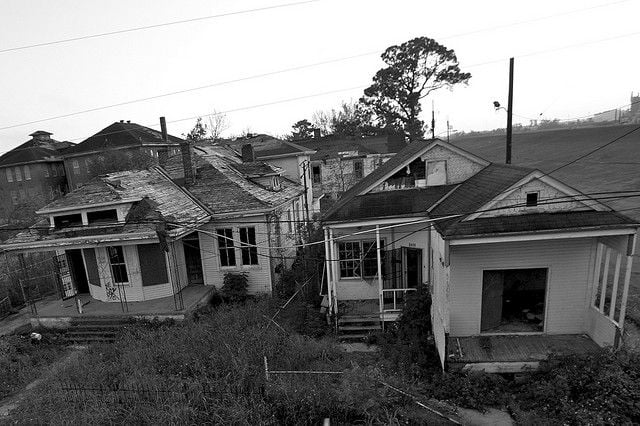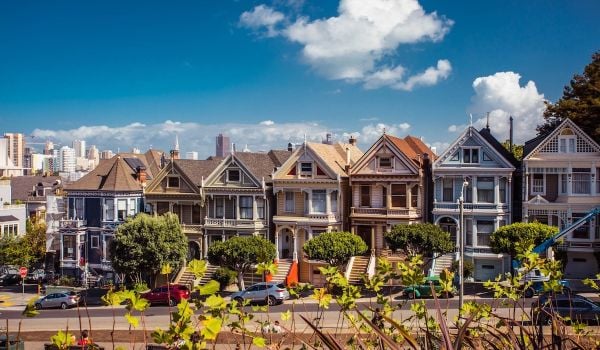On August 29, 2005 — eight years ago today — Hurricane Katrina hit the Gulf Coast and federal levees failed in New Orleans, flooding the city. We honor the lives interrupted or lost to the deluge by turning our attention this week to the city’s recovery.
Eight years is not enough time to recover from disaster. Yet despite the odds stacked against it, New Orleans soldiers on eight years after Hurricane Katrina. This June, the New Orleans Business Alliance unveiled a five-year plan for economic development that hopes to diversify the city’s slow-moving regrowth.
That’s all ProsperityNOLA is right now: a plan. (“Roadmap” is the buzzword.) There isn’t any political muscle lobbying for tax-increment financing districts. There are no tax incentives for oil companies, thank god. It simply identifies five industry clusters with opportunities for growth: Advanced manufacturing, health sciences, creative digital media, sustainable industries, and transportation and trade.
It’s one of those reports big on grandstanding and light on policy, which the Business Alliance is well aware of. “To call it a framework is probably too aggressive,” said Rod Miller, president and CEO of the Alliance. “It’s a plan that is keenly focused on the city of New Orleans and attracting businesses here.”
Which is not to say that ProsperityNOLA is just an overly optimistic term paper. “I believe this is an unusually bad time for reflexive cynicism,” Mark Moseley wrote at The Lens, a local investigative news site, last month. “I don’t see ProsperityNOLA as some magical plan, but it is the plan on the table at a crucial time. This isn’t one of those initiatives to dismiss out of hand.”
Look, there are flaws. But ProsperityNOLA isn’t supposed to be some New Deal-scale project. Marla Nelson, associate professor and program coordinator of the Urban and Regional Planning Program at the University of New Orleans, said it’s notable that the plan even exists.
“When I look at this, to my knowledge, this is the first type of plan the city has ever had,” he said. “So I think that’s positive that there is at least some strategic thinking about what needs to be done.”
Namely, more quality jobs. Especially those that aren’t in either a) tourism or b) oil and gas. I asked Melissa Ehlinger, the Business Alliance’s vice president of strategy, policy and research, what’s meant by “quality jobs.”
“We’re talking about the kind of jobs that have family-supporting wages,” she said. “And they often don’t require a four-year degree.”
This is something, as Nelson said, that hasn’t happened before. The jobs in the tourism industry offer low wages and little opportunity of upward mobility. Hotel workers in the Big Easy aren’t really unionized like their counterparts in New York City and Las Vegas, so they aren’t getting higher wages and don’t have much job protection.
ProsperityNOLA doesn’t shun the tourism industry, but it bears noting that tourism is absent from the plan. The Business Alliance is trying to attract businesses outside of the traditional sectors. And now is the time for the city to explore viable job clusters that might breed long-term success.
“The stakes are high right now,” Moseley wrote. “Disaster recovery dollars are drying up just as bills are coming due for flood protection upkeep, consent decree mandates, and repairs to water works. Will New Orleans power through the headwinds or falter and slide back into the doldrums?”
The only thing that can power New Orleans through the headwinds is a more diverse and equitable economy. “At least there is finally this focus on equity and social justice [with ProsperityNOLA],” Nelson said. “At least we’re talking about it.”
ProsperityNOLA isn’t going to usher in sweeping changes. But it does give lawmakers and residents cues, from an emphasis on minority-owned businesses to on-the-job training, for what constitutes a healthy way forward.
The Equity Factor is made possible with the support of the Surdna Foundation.

Bill Bradley is a writer and reporter living in Brooklyn. His work has appeared in Deadspin, GQ, and Vanity Fair, among others.

















